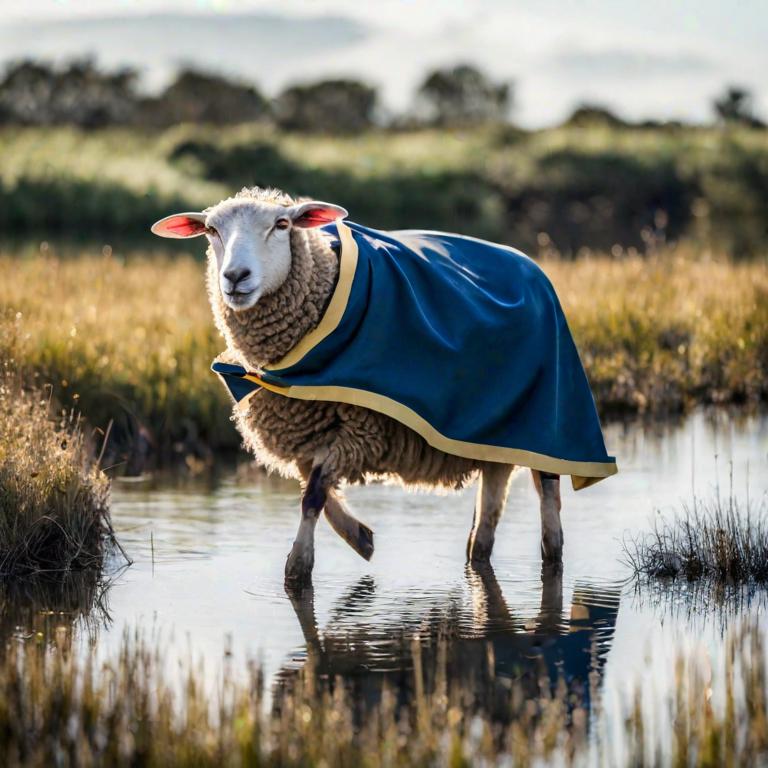- Regular Price
- £19.99
- Sale Price
- £19.99
- Regular Price
- £19.99
- Unit Price
- per

Two weeks ago, I said to myself, "Surely this month can't get any more wet and miserable." I must have forgotten to touch wood. Since then, the UK has experienced not one, but two major storms, causing widespread power outages and flooding.
Climate change does exactly what it says on the tin.
It's causing some places to get too wet, and others dry up - like the planet's wetlands - that are crucial for biodiversity. You probably haven't heard of World Wetlands Day (celebrated every 2nd February), but it's an important one. The Wool Company has always championed environmental health through our sustainable practices and celebrating super-powered habitats resonates strongly with us. You might be surprised to learn that even our woolly friends are helping to sustain these environments!
The Kidneys of the Landscape
So, what exactly are wetlands? They come in all shapes and sizes; from peat bogs to fens to saltmarsh to wet woodlands and many more. While comprising just 6% of the Earth's land surface, wetlands support a remarkable 40% of all plant and animal species, serving as crucial habitats for living and breeding.

Peatlands, like this one in Indonesia, make up half of the Earth's wetlands
Photo © Wetlands International
The biodiversity in wetlands holds significance for humans, too. These ecosystems play a vital role in regulating water, encompassing functions like flood control and water purification (like kidneys!). With over a billion people, approximately one in eight individuals worldwide, relying on wetlands for their livelihoods, the importance of these areas extends globally.
What's Going Wrong?
Time for the sad part. Over a third of the world's wetlands have disappeared since 1970. Why? It stems from a combination of natural and human-induced factors. Historical drainage for agriculture, urban development, pollution from runoff, industrial discharges, and climate change all contribute to the degradation of wetland ecosystems.
Invasive species, overexploitation, and alterations in land use further exacerbate the issue. Infrastructure development disrupts water flow, while a lack of awareness and regulatory measures allows unsustainable practices.
Sheep to the Rescue!
Believe it or not - sheep can play a vital role in wetland regeneration and maintenance. They are very fussy eaters, favouring broad-leaved vegetation which are often unwanted weeds like dock and nettle, helping to promote native vegetation species.
A flock of Manx Loaghtan sheep were brought onto the reserve at WWT Welney Wetland Centre to help with the conservation grazing. Learn more about Conservation Grazing here.
Manx Loaghtan is a hardy, primitive rare breed of sheep that originiated on the Isle of Man. Around twelve years ago we actually cared for the 'national flock' as designated by the Rare Breeds Survival Trust, of Manx Loaghtan in England. Fortunately they are a very tough breed, (they lamb usually without help) on the hill, make great mothers, and are very happy in the wet.
At low intensity stock rates, grazing aids in vegetation management, preventing the dominance of certain species that could harm the wetland habitat. In regions prone to wildfires, targeted sheep grazing reduces the risk by managing flammable vegetation. Sheep are also vital for the management of traditional wildflower, hay meadows.

Manx Loagthan Sheep on Isle on Man by John Caley © 2011 Manx National Heritage
Conclusion
Sheep really are superpowered. They produce one of the most remarkable natural materials (you can read more about all that HERE), and (provided there are not too many of them on the land) they do it whilst helping to preserve our planet.
Whilst I've had my fill of wet weather for the time being, I'll be putting out the flags on the 2nd February to commemorate World Wetlands Day.
Further Reading
WWT - Wildfowl and Wetlands Trust
https://www.conservation.org/blog/5-things-you-should-know-about-wetlands
3 comments
I always learn something new and fascinating with your timely, thoughtful and brilliantly written blogs!
I love reading your interesting blogs Harry!
Very informative, and we all must try to do our best to help nature.
And what lovely products are made with sheeps wool, (what would we do without it I wonder), and sheepskin (ssshhh – I hope they didn’t hear that bit).
Thank you for this most interesting post. I know little about sheep, but I thought they did not like having wet feet?
Let us hope both wetlands and sheep live long, for the sake of the planet.